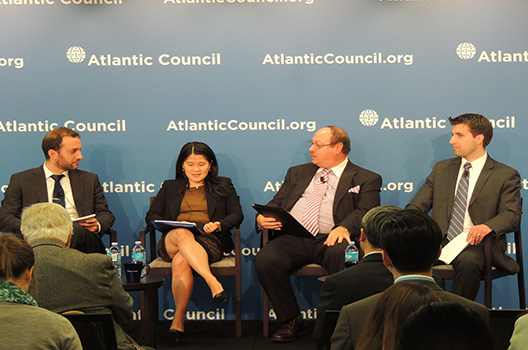 On December 9, the Brent Scowcroft Center on International Security’s Asia Security Initiative hosted a Cross-Straits Series event on the future of Taiwan’s defense role. The discussion brings together Ms. Joanna Yu Taylor, Adjunct Member of the RAND Corporation; Mr. Robert Manning, Senior Fellow at the Atlantic Council’s Brent Scowcroft Center on International Security; and Mr. Ian Easton, Research Fellow of the Project 2049 Institute. The discussion was moderated by Mr. Isaac Stone Fish, Asia Editor at Foreign Policy.
On December 9, the Brent Scowcroft Center on International Security’s Asia Security Initiative hosted a Cross-Straits Series event on the future of Taiwan’s defense role. The discussion brings together Ms. Joanna Yu Taylor, Adjunct Member of the RAND Corporation; Mr. Robert Manning, Senior Fellow at the Atlantic Council’s Brent Scowcroft Center on International Security; and Mr. Ian Easton, Research Fellow of the Project 2049 Institute. The discussion was moderated by Mr. Isaac Stone Fish, Asia Editor at Foreign Policy.
The discussion began with Ms. Taylor’s predictions on how the January 2016 Taiwanese elections might affect Taiwan’s national security. The Democratic Progressive Party (DPP), which has been projected to defeat the ruling Kuomintang (KMT) in the election, is expected not to make a significant change on the current Taiwan’s defense strategy, but put more emphasis on building up a strong indigenous defense strategy, she said. She pointed out the three broad emerging factors in Taiwan’s defense: (1) a greater push to improve indigenous defense; (2) the efforts to ensure an evolution of Taiwan’s military and its service system; and (3) the renewal of security ties with the United States and Japan.
Mr. Manning provided the future of Taiwan’s role in a regional context, commenting on the Taiwanese submarine program. First, he spoke about the enormous changes in the region, such as the intensified military competition, and intra-Asian cooperation among Japan, Vietnam, India, and the Philippines. In the new context, Taiwan has a lot of capacity to contribute. In terms of its submarine program, Taiwan is tremendously important in its pivotal geographical placement. Taiwan has invested a lot of effort in countering the Chinese anti-access/area denial (A2/AD) strategy, and a lot more in the maritime domain, sea-based radars, and warning systems. Finally, Mr. Easton spoke on the arms sale package, pointing out why a US arms sales matters and what drawbacks are expected in the future. He presented the reasons that this arms sale is crucial to Taiwan on three levels: strategic level, operational level, and tactical level. In regards to potential drawbacks, he was worried about potential damage to the US-China relationship, threats of Chinese espionage, and the symbolic implication derived from the arms sale. However, in spite of future arms sale challenges, he provided an optimistic view based on the historically proven fact that there is no lasting damage to the relationship.
